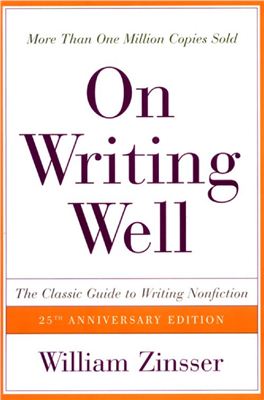Collins 2001, ISBN: 0-06-000664-1, c.322.
Amazon.com Review.
Whether you write an occasional professional letter or a daily newspaper column, William Zinsser's On Writing Well should be required reading. Simplicity is Zinsser's mantra: he preaches a stripped-down writing style, strong and clear. He has no patience for excess (most use of adjectives and adverbs, he writes, just adds clutter) or tired phraseology (for instance, he'd like to outlaw all leads involving those "future archaeologists" most often found "stumbl[ing] upon the remains of our civilization"). He recommends that all writers of nonfiction read their work aloud (don't commit something to paper that you wouldn't actually say) and write under the assumption that "the reader knows nothing" (not to be confused with assuming the reader's an idiot). In addition to the chapters on the expected-usage, audience, interviews, leads-Zinsser also focuses on such trouble spots as science and technical writing, business writing, sports, and humor.
Amazon.com Review.
Whether you write an occasional professional letter or a daily newspaper column, William Zinsser's On Writing Well should be required reading. Simplicity is Zinsser's mantra: he preaches a stripped-down writing style, strong and clear. He has no patience for excess (most use of adjectives and adverbs, he writes, just adds clutter) or tired phraseology (for instance, he'd like to outlaw all leads involving those "future archaeologists" most often found "stumbl[ing] upon the remains of our civilization"). He recommends that all writers of nonfiction read their work aloud (don't commit something to paper that you wouldn't actually say) and write under the assumption that "the reader knows nothing" (not to be confused with assuming the reader's an idiot). In addition to the chapters on the expected-usage, audience, interviews, leads-Zinsser also focuses on such trouble spots as science and technical writing, business writing, sports, and humor.

